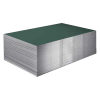Properties
- Specific for areas where improved impact resistance is required
- Application of areas where moisture resistance is needed
- Superior fire protection and performance improved
- Surface durability compared to standard drywall boards
- Improved sound insulation due to high dense core
- Environmentally friendly
- Easy, fast and dry application
Board Standards Compliance
EN520: 2004 + A1:2009 Gypsum Plaster boards, definitions, requirements and test methods.
Type D: Gypsum boards with control density, with a face to which suitable gypsum plasters or decoration may be applied. This enables improved performance in certain applications to be obtained.
Type F: Gypsum boards with improved core adhesion at high temperatures, with a face to which suitable gypsum plasters or decoration may be applied. These boards have mineral fibers and/or other additives in the gypsum core to improve core adhesion at high temperatures.
Type I: Gypsum boards with enhanced surface hardness. Boards which are used for applications where higher surface hardness is required. They have a face to which suitable gypsum plasters or decoration may be applied.
Type R: Gypsum boards with enhanced strength. These boards are for special applications where higher strength is required and have both increased longitudinal and transverse breaking loads. They have a face to which suitable gypsum plasters or decorations may be applied.
Type H (H1): Gypsum Boards with enhanced water absorption rate. These boards are suitable for special applications in which reduced water absorption properties are required to improve the performance of the board.




